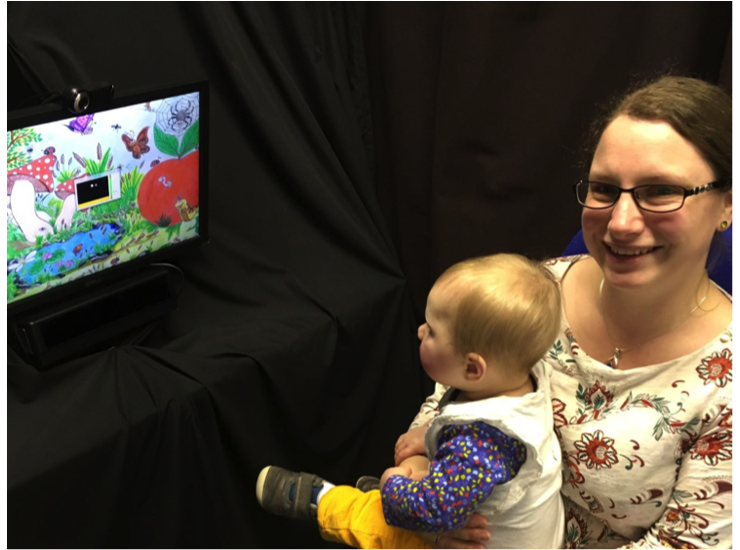
We know that babies begin actively exploring their world from the very beginning – or even from before birth, as recent research from LuCiD colleagues has demonstrated (1). We also know that the language children hear can shape these interactions; for example, hearing words prompts children to play with objects for longer (2), or to place items in different categories (3).
However, could simply knowing – not hearing – something’s name affect how children experience it? Our recent work from LuCiD suggests that yes, it can – even before babies can speak.
We asked parents of 10-month-old, pre-speech babies to take two toys home with them and play with the toys with their child, every day for a week. Parents were told the name of one toy, but not the other; and asked to use this name for the appropriate toy, but try to give their baby a similar level of experience with each.
 Then, we invited parents and babies to Lancaster Babylab to take part in a simple looking-time task. We showed babies single pictures of each object in turn, in silence, and then recorded how long babies looked at the objects using an eye-tracker.
Then, we invited parents and babies to Lancaster Babylab to take part in a simple looking-time task. We showed babies single pictures of each object in turn, in silence, and then recorded how long babies looked at the objects using an eye-tracker.
For decades now researchers have known that the amount of time babies spend looking at something reflects what they know about it; this is known as the novelty preference (4): babies look for longer at more interesting things. So, if babies looked longer to one object than to the other, this would be evidence that they were more interested in that object.
And this is what we found. Even though they had the same amount of experience with each object, and despite seeing them in silence, babies preferred to look at the object that they had learned a name for at home. This could be for two reasons: first, we know that 18-month-old toddlers will bring to mind the name of an object when they see it (5), and we also know that toddlers will play with toys for longer if they hear their names (2). Perhaps these very young babies, even before the onset of speech, can also do this. So, when they saw the object that they had learned a name for, they thought of the name, which prompted them to look for longer. Alternatively, babies may find the object more interesting because they are anticipating a name and are surprised when they don’t hear it.
It’s up to future work to tease apart these two explanations, but what’s most exciting about this study is that it provides new evidence that language gets up and running well before babies begin to speak. Importantly, then, you can support your baby’s language development by speaking to them in these early, pre-speech months, despite the fact they can’t reply! And perhaps even more exciting for this language geek, it demonstrates the amazing power of language to silently shape the way humans see and experience the world, even before we learn to speak.
Acknowledgements:
Huge thanks to all the parents and babies who took part – we couldn’t do it without you! This work was supported by the ERSC International Centre for Language and Communicative Development (LuCiD; ES/L008955/1), and an ESRC Future Research Leaders grant to Dr. Katie Twomey (ES/N01703X/1).
Further reading:
Download the paper for free
Download a talk given by Katie Twomey at the 1st Lancaster Conference on Infant and Child Development, Lancaster, UK
Download a poster presented at the 38th Annual Meeting of the Cognitive Science Society, Philadelphia, PA, USA
References:
(1) Reid, V. M., Dunn, K., Young, R. J., Amu, J., Donovan, T., & Reissland, N. (2017). The human fetus preferentially engages with face-like visual stimuli. Current Biology. Retrieved from http://www.sciencedirect.com/science/article/pii/S0960982217305808
(2) Baldwin, D. A., & Markman, E. M. (1989). Establishing word-object relations: A first step. Child Development Vol 60(2) Apr 1989, 381-398.
(3) Althaus, N., & Westermann, G. (2016). Labels constructively shape object categories in 10-month-old infants. Journal of Experimental Child Psychology, 151, 5–17. https://doi.org/10.1016/j.jecp.2015.11.013
(4) Fantz, R. L. (1964). Visual experience in infants: Decreased attention familiar patterns relative to novel ones. Science, 146(668–670). https://doi.org/http://dx.doi.org/10.1126/science.146.3644.668
(5) Mani, N., & Plunkett, K. (2010). In the Infant’s Mind’s Ear Evidence for Implicit Naming in 18-Month-Olds. Psychological Science, 21(7), 908–913. https://doi.org/10.1177/0956797610373371

